Terry Teachout's Blog, page 99
February 21, 2013
TT: Arise and go to Innisfree
* * *
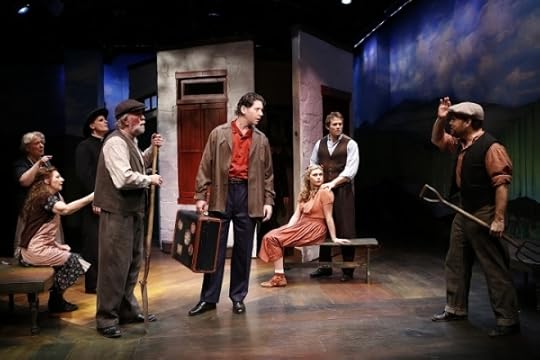 Turning a classic movie into a stage musical is a risky proposition that usually pays off in grief. When the source material is ultra-familiar and the original film full of top-tier stars, it's all but impossible to survive the comparison game. Johnny Burke, one of the greatest lyricists of the golden age of Hollywood musicals, tried to bring John Ford's "The Quiet Man" to Broadway in 1961 and failed dismally. "Donnybrook!" closed after 68 performances and was never seen again--until now. It makes sense that the Irish Repertory Theatre should have taken an interest in a musical set in Innisfree, and Charlotte Moore, the company's artistic director, has contrived with her usual deftness to paper over the show's flaws and bring its considerable charms to the fore.
Turning a classic movie into a stage musical is a risky proposition that usually pays off in grief. When the source material is ultra-familiar and the original film full of top-tier stars, it's all but impossible to survive the comparison game. Johnny Burke, one of the greatest lyricists of the golden age of Hollywood musicals, tried to bring John Ford's "The Quiet Man" to Broadway in 1961 and failed dismally. "Donnybrook!" closed after 68 performances and was never seen again--until now. It makes sense that the Irish Repertory Theatre should have taken an interest in a musical set in Innisfree, and Charlotte Moore, the company's artistic director, has contrived with her usual deftness to paper over the show's flaws and bring its considerable charms to the fore.The comparison game always starts with casting. Whom do you put in a musical whose original film version starred John Wayne, Maureen O'Hara and a gaggle of scene-stealing character actors? In Wayne's case, Ms. Moore has opted for a tall, bluff fellow with a magnificent singing voice. James Barbour, who was last seen on Broadway in "A Tale of Two Cities," is a sterling-silver musical-comedy baritone, and "Donnybrook!" takes wing whenever he opens his mouth. No, he doesn't have Wayne's redwood-like physical presence, but the Duke, on the other hand, couldn't carry a tune in a holster, so I'd call it a draw....
The main reason for the initial failure of "Donnybrook!" was Mr. Burke's good-to-middling score, for which he supplied both words and music. While he was a big-league lyricist, Mr. Burke was strictly an amateur composer--it was his longtime collaboration with Jimmy Van Heusen that put him on the map--and "Donnybrook!" contains only one song, "Sad Was the Day," that is comparable in quality to the songs that he wrote with Mr. Van Heusen. (Stephen Sondheim included it in a list of songs he wished he'd written.) To that end, Ms. Moore has done no small amount of smart musical tinkering, dropping some of the weaker songs and interpolating two blue-chip Burke-Van Heusen ballads, "But Beautiful" and "It Could Happen to You," plus an assortment of authentic Irish tunes...
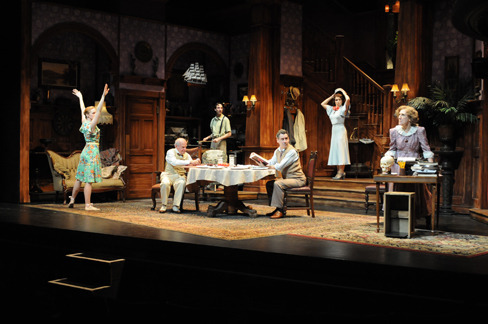 Now that regional theaters across the country are feeling the economic bite, they're increasingly steering clear of large-cast, big-budget plays. Not so Florida's Asolo Repertory Theatre, which has just revived "You Can't Take It With You," the 1936 screwball farce about a loony but lovable Depression-era family that won George S. Kaufman and Moss Hart a Pulitzer Prize and was turned by Frank Capra into an equally popular (if less effective) movie. If you've come down with the February blues, this production will return you to the right side of the bed.
Now that regional theaters across the country are feeling the economic bite, they're increasingly steering clear of large-cast, big-budget plays. Not so Florida's Asolo Repertory Theatre, which has just revived "You Can't Take It With You," the 1936 screwball farce about a loony but lovable Depression-era family that won George S. Kaufman and Moss Hart a Pulitzer Prize and was turned by Frank Capra into an equally popular (if less effective) movie. If you've come down with the February blues, this production will return you to the right side of the bed. "You Can't Take It With You" calls for a cast of 19, thus putting out of reach of most of today's professional troupes. Fortunately, Asolo Rep, a regional company that doubles as a drama school, can use student actors to cover smaller roles, as it did last season with "Once in a Lifetime," the first Kaufman-Hart collaboration, and is doing again now. I know all about lightning not striking twice, but this production, soundly and skillfully directed by Peter Amster, is at least as good as its predecessor....
* * *
Read the whole thing here .
A trailer for Donnybrook!:
TT: Almanac
Eugène Ionesco, Victims of Duty
February 20, 2013
TT: So you want to see a show?
Here's my list of recommended Broadway, off-Broadway, and out-of-town shows, updated weekly. In all cases, I gave these shows favorable reviews (if sometimes qualifiedly so) in The Wall Street Journal when they opened. For more information, click on the title.
BROADWAY:
• Annie (musical, G, reviewed here)
• Once (musical, G/PG-13, nearly all performances sold out last week, reviewed here)
OFF BROADWAY:
• All in the Timing (comedy, PG-13, extended through Apr. 14, reviewed here)
• Avenue Q (musical, R, adult subject matter and one show-stopping scene of puppet-on-puppet sex, reviewed here)
• The Fantasticks (musical, G, suitable for children capable of enjoying a love story, reviewed here)
IN ORLANDO, FLA.:
• Othello (Shakespeare, PG-13, closes Mar. 16, reviewed here)
CLOSING SOON ON BROADWAY:
• The Mystery of Edwin Drood (musical, PG-13, closes Mar. 10, reviewed here)
CLOSING NEXT WEEK ON BROADWAY:
• The Other Place (drama, PG-13, closes Mar. 3, most performances sold out last week, reviewed here)
• Who's Afraid of Virginia Woolf? (drama, PG-13/R, closes Mar. 3, reviewed here)
CLOSING NEXT WEEK IN WEST PALM BEACH, FLA.:
• A Raisin in the Sun (drama, PG-13, closes Mar. 3, reviewed here)
CLOSING SUNDAY IN ORLANDO, FLA.:
• Laughter on the 23rd Floor (comedy, PG-13, reviewed here)
CLOSING SUNDAY ON BROADWAY:
• Picnic (drama, PG-13, most performances sold out last week, reviewed here)
TT: Almanac
Eugène Ionesco, Jacques or the Submission
February 19, 2013
TT: Almanac
Eugène Ionesco, Paris Review interview, fall 1984
TT: Snapshot
(This is the latest in a series of arts-related videos that appear in this space each Monday and Wednesday.)
TT: The conditions that prevail
Driving home from work one evening last week I listened to an interview on NPR with a writer who has just published her third novel. Her voice is soft and modulated, well suited for radio, a medium that encourages an impression of intimacy with people we will never meet. She gamely answered the interviewer's questions, acknowledged her plot was inspired by a real crime committed several years ago, and credited her young son with several of the best lines in the novel. The impression she gave, whether the real thing, artifice or some crafted mingling of both, was favorable. I might enjoy a conversation with her, I thought, yet the performance, which consumed more than eight minutes during "drive time," left me with a mild aftertaste of disgust....
Patrick, a blogger of whom I think highly, then quotes from an essay by L.E. Sissman , a poet and essayist whom we both admire:
In a word, the serious writer must take serious vows if he is to concentrate on his chief aim. A vow of silence, except through his work. A vow of consistency, sticking with writing to the exclusion of other fields. A vow of ego-chastity, abstaining from adulation. A vow of solitude, or at least long periods of privacy. A vow of self-regard, placing the self as writer before the self as personality.
Says D.G. Myers, writing in response to Patrick's posting:
For a serious writer, there is something vaguely distasteful about the need to market one's books. Perhaps the source lies in class feeling, an ill-defined condescension to the life of commerce. Or perhaps the source lies in an impatience to get back to writing, the querulous feeling that one is wasting unrecoverable time in the pursuit of something other than literature. Whatever its source, the distaste is real and not to be denied. And when those of us who are serious about writing hear someone publicly talking about her books--hawking her wares instead of letting her prose do all the talking--we realize that we are not hearing about literature at all, but about the acceptable substitutes which are offered to a world not much interested in literature. We experience the same involuntary unease. It is impossible to live wholly for literature, but it is disgusting that we cannot.
 I understand, and up to a point--if not further--I even sympathize. "A boy must peddle his book," Truman Capote is supposed to have said in explanation of some outrageous public exploit intended to publicize In Cold Blood. I think most people would agree that such activities helped to destroy Capote as a writer. If you get to where you prefer peddling books to writing them, then you're in the wrong line of work.
I understand, and up to a point--if not further--I even sympathize. "A boy must peddle his book," Truman Capote is supposed to have said in explanation of some outrageous public exploit intended to publicize In Cold Blood. I think most people would agree that such activities helped to destroy Capote as a writer. If you get to where you prefer peddling books to writing them, then you're in the wrong line of work.Nevertheless, I can't go the rest of the way with my esteemed colleagues. While I don't claim to be anything like a great artist, I do think that I'm a serious writer. In addition to the countless newspaper and magazine articles that constitute my "day job," I've published three wholly serious biographies , a memoir , and a self-anthology of my cultural journalism, and I've also written a play and two opera libretti. What's more, I've peddled my varied literary wares by going on radio and TV, giving lectures and readings, making bookstore appearances, and promoting my work on Twitter, Facebook, and this blog, and I don't find any of those activities distasteful, not in the least.
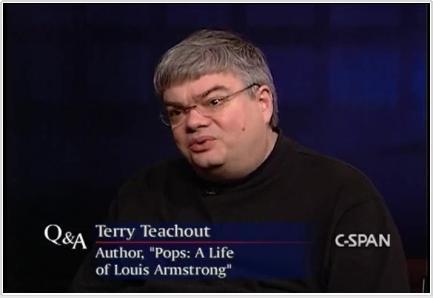 Why do I do them?
Why do I do them?• To make more money.
• Because I think enough of my work to believe that it ought to be read, or seen, by as many people as possible.
• To contribute (insofar as circumstances permit) to a fuller appreciation of what I write and why I write it.
• To increase the chances that my future books will be published and my future stage works produced.
All of which is a long-winded way of saying that in addition to being a serious writer, I'm also a professional writer, a man who lives by his pen. I come from a middle-class family--my parents didn't leave me a dime--and so I work for a living. Writing is the work that I do best. It's my job, not my hobby. In the words of the drama critic James Agate, "A professional is a man who can do his job when he doesn't feel like it; an amateur is one who can't when he does feel like it."
Marketing my work--peddling it, if you like--is part of that job. It doesn't embarrass me to tell people why I think they might enjoy reading my books or seeing my shows. Sometimes it's fun, sometimes wearying, sometimes both. On occasion it can be ludicrous. (Yes, I've given interviews to TV twinkies who didn't have the least notion of what the book that we were purportedly "discussing" was about.) But I know that if I don't do the bad part faithfully, I won't get to do the good part anymore. I wish it were otherwise, but as Jimmy Durante used to say, "Them is the conditions that prevails."
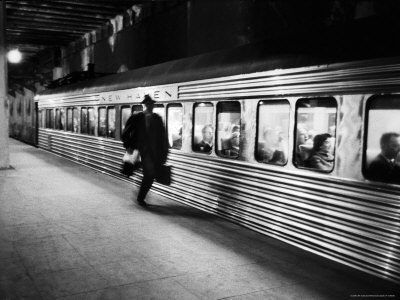 Would I write if I didn't get paid to do so? Probably, but I wouldn't have as much time to do so, because I'd be forced to spend eight or more hours a day doing something other than writing, something that would almost certainly be less satisfying. Only a fool would disagree lightly with L.E. Sissman, but when he said that a serious writer should stick with writing "to the exclusion of other fields," he neglected to mention that he wrote his poems and essays in the interstices of holding down a full-time job as an advertising executive.
Would I write if I didn't get paid to do so? Probably, but I wouldn't have as much time to do so, because I'd be forced to spend eight or more hours a day doing something other than writing, something that would almost certainly be less satisfying. Only a fool would disagree lightly with L.E. Sissman, but when he said that a serious writer should stick with writing "to the exclusion of other fields," he neglected to mention that he wrote his poems and essays in the interstices of holding down a full-time job as an advertising executive.That's pretty much what I do, too. The only difference is that I've managed to a degree comparatively uncommon among serious writers to fully professionalize my work. No, I couldn't make a living writing only biographies or plays or operas, but between my day job (which I also take very seriously) and my creative work, I manage to pay the rent.
It is impossible to live wholly for literature, but it is disgusting that we cannot. Disgusting? Really? I don't see it. Maybe I'd be a better writer if I did, but I've never thought that the world owed me a living, least of all for doing the kind of writing that I do. I consider it a blessing that I get paid to do it, and if that means that I have to spend a certain amount of time gripping and grinning, so what? It's a nice problem to have.
* * *
Jimmy Durante sings "Durante, the Patron of the Arts" on Command Performance in 1944:
February 18, 2013
TT: Almanac
Eugène Ionesco, Découvertes
TT: Lookback
I just saw the press preview of Wicked, a new Broadway musical based on the novel of the same name by Gregory Maguire. I brought with me a friend who is a huge Maguire fan, and who bristled visibly at every departure from the original. Not having read the novel, I wasn't bothered by the differences, even after my friend told me how extensively the authors of the show had altered what Maguire wrote. But I knew how she felt. If you're going to make a stage or screen adaptation of a familiar work of art, you really only have two viable alternatives: try to reproduce the original as closely as possible, or go your own way. Anything in between is doomed to failure....
Read the whole thing here .
TT: (Not) myself when young
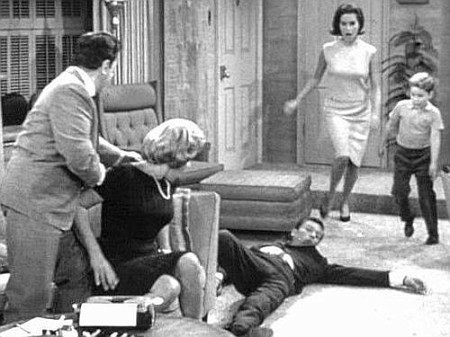 It struck me the other day that my ten-year-old self would be well and truly boggled by the fact that I regularly read tweets by Dick Van Dyke (who tweets as @iammrvandy) and Carl Reiner (who tweets as @carlreiner).
It struck me the other day that my ten-year-old self would be well and truly boggled by the fact that I regularly read tweets by Dick Van Dyke (who tweets as @iammrvandy) and Carl Reiner (who tweets as @carlreiner).If those names mean nothing to you, then you're a whole lot younger than I am. The Teachout family watched The Dick Van Dyke Show every week without fail. It was a ritual as regular as going to church on Sunday or listening to Paul Harvey on the kitchen radio before school. For me to suppose that the celebrities whom we saw cavorting on the screen would eventually be able to communicate more or less directly with their aging fans would have been far beyond imagining. It was good enough that I got to watch their black-and-white images flickering on the TV set in our living room. What did I know?
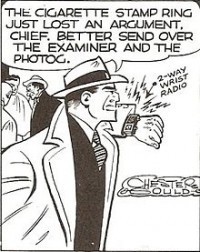 Needless to say, the laptop computer on which I perform this technological miracle would boggle myself when young even more comprehensively. I'm old enough to remember grappling with the notion that Dick Tracy might someday be able to communicate with his colleagues via two-way wrist radio. It was in 1964 that Tracy acquired his first two-way wrist TV, and that really seemed too good to be true.
Needless to say, the laptop computer on which I perform this technological miracle would boggle myself when young even more comprehensively. I'm old enough to remember grappling with the notion that Dick Tracy might someday be able to communicate with his colleagues via two-way wrist radio. It was in 1964 that Tracy acquired his first two-way wrist TV, and that really seemed too good to be true.Yes, the postmodern technologies that have transformed American life almost beyond recognition are astonishing. But I wonder whether we spend too much time talking about the devices themselves and not enough thinking about the quotidian ways in which they've changed the way we live. Unless you're an engineer, after all, what's interesting about an iPad is what it does, not how it works.
As Arthur C. Clarke observed in 1962, "Any sufficiently advanced technology is indistinguishable from magic." I'm content to revel in the magic, and as a man whose adult life coincides almost exactly with the introduction of the mass-market videocassette recorder, I'm surprised that I'm able to take so much of the world around me for granted.
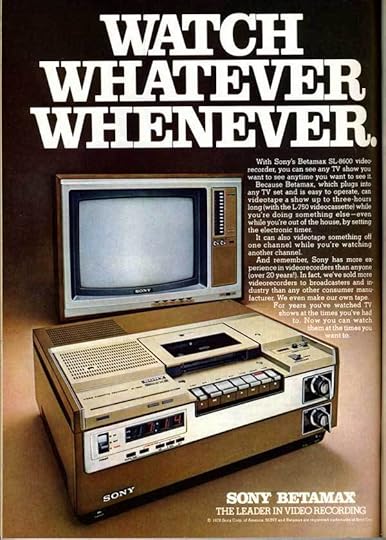 I recently spent a few minutes thinking about how my life today is different than it was in the Sixties, and the following things came to mind. Other than on vanishingly rare occasions, I no longer:
I recently spent a few minutes thinking about how my life today is different than it was in the Sixties, and the following things came to mind. Other than on vanishingly rare occasions, I no longer:• Mail personal letters
• Write checks
• Order anything by mail or phone
• Shop at record stores or brick-and-mortar bookstores
• Make popcorn in a skillet or heat soup on a stove
• Listen to terrestrial radio (other than when driving in a car)
• Sit down in front of the TV every night to find out whether it's going to rain tomorrow
• Adjust the antenna to make the picture come in more clearly
• Do business with bank tellers
• Use bottle openers
• Use phone books
• Use dictionaries or encyclopedias
• Use pay phones
• Have a landline
• Own a camera
• Wear a watch
 What's even more surprising--at least to me--is that I scarcely ever think about any of these things, nostalgically or otherwise. Nor do I miss them, any more than I miss the things that I included in a list of "things I no longer use, do, or see" that I posted in this space
eight years ago
.
What's even more surprising--at least to me--is that I scarcely ever think about any of these things, nostalgically or otherwise. Nor do I miss them, any more than I miss the things that I included in a list of "things I no longer use, do, or see" that I posted in this space
eight years ago
.It's not that I'm an unsentimental person. If I were, it wouldn't amuse me to keep up with the fugitive thoughts of Dick Van Dyke. I loved the lost world of my youth, and I treasure my still-vivid memories of that world. But when it comes to getting through the day, I'm far more inclined to be grateful that so much waste motion has been cut out of my life, and to marvel at the countless doors that the new technology has opened. Yes, it's the most mixed of blessings, one that at times bears a suspicious resemblance to a curse. But I've used it to write plays, make friends, court women, and earn my daily bread, and I wouldn't have it any other way.
Terry Teachout's Blog
- Terry Teachout's profile
- 45 followers



